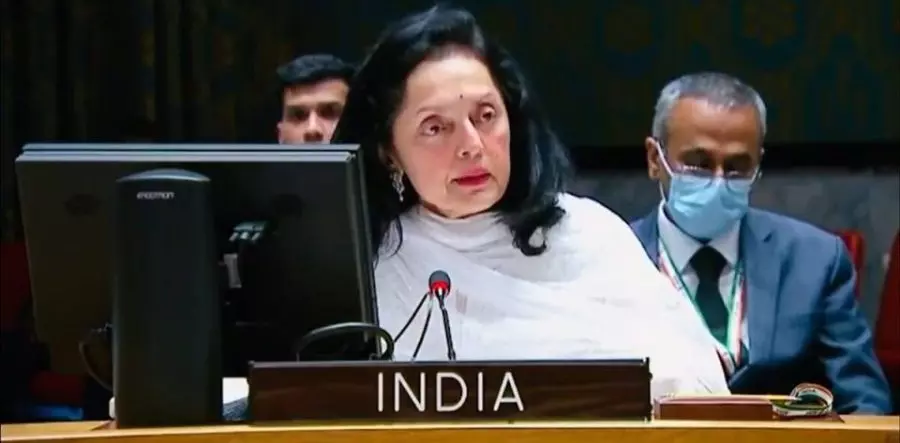In a veiled attack on China, India lashed out at the practice of countries in the United Nations Security Council, who use their veto powers to block evidence-based terrorist listings.
This practice is uncalled for and smacks of “doublespeak” considering the Council's commitment to tackle the challenge of terrorism, said India's Permanent Representative to the United Nations, Ruchira Kamboj, at a session of the United Nations Security Council.
Terming this veto as a “disguised” and a "more impervious one" that actually required a discussion among a wider membership, Kamboj pointed out, “For genuine evidence-based listing proposals for globally sanctioned terrorists to be blocked without giving any due justification is uncalled for and smacks of doublespeak when it comes to the council's commitment in tackling the challenge of terrorism."
Pakistan-based Lashkar-e-Taiba terrorist Sajid Mir is wanted for his involvement in the 26/11 Mumbai terror attacks, which killed 166 people and injured over 300.
However, China had put a technical hold on the proposal made by India and the United States to the United Nations Security Council's (UNSC) 1267 Al Qaeda Sanctions Committee to designate Mir as a global terrorist. All the members countriesare required to give their nod to a proposal.
Call for UNSC reforms
In her address at the UN Security Council session, Kamboj also raised the concerns of the troop and police contributing countries should be addressed for better implementation of peacekeeping mandates. India is one of the largest troop-contributing countries. “There is a need to review the agenda of the council and remove obsolete and irrelevant items from the agenda of the Security Council," she stressed.
In this manner, India also again made a call for UNSC reforms. In February 2024, during the Raisana Dialogue event, external affairs minister S Jaishankar had said that the Security Council reforms faced complex geopolitical challenges and diverse positions and even added that the biggest opponent” of UNSC reforms “is not a western country”, directly alluding to China without naming it.
India has projected itself as a candidate for a permanent seat in an expanded UN Security Council, along with Japan, Germany and Brazil.
Reflect contemporary realities
Further, Kamboj in her address called those countries blocking progress on this vital issue to heed calls for genuine reform and contribute to making this council truly fit for purpose for the 21st century.
Kamboj demanded expansion in both the member categories –the P 5 and the 10 non-permanent members (e ten). The Security Council needs to better reflect contemporary realities, and the geographical and developmental diversity of the multipolar world of today, including the voices of the developing countries and unrepresented regions like Africa, Latin America, and the vast majority of Asia and the Pacific.
The debate on working methods, however, remains extremely relevant, she pressed on.
"As an organ of the United Nations tasked with the maintenance of international peace and security, the debate on working methods remains extremely relevant, especially in the backdrop of Ukraine and Gaza,she said, adding that the question as to how much the Security Council has been able to deliver on peace and security “with both feet firmly fixed in the past” is a larger question member states need to collectively reflect on," she added.



